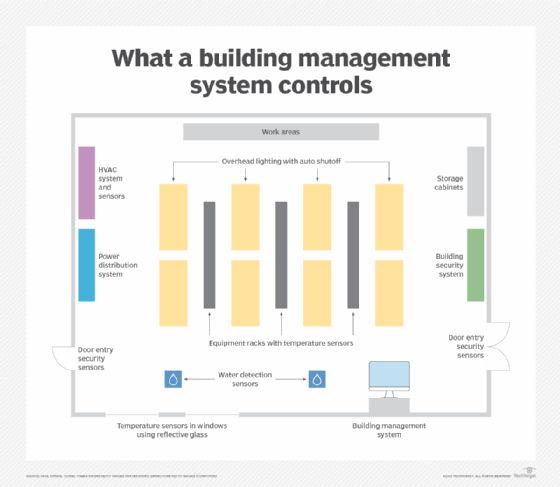building management system
What is a building management system?
A building management system (BMS) is a control system that can be used to monitor and manage the mechanical, electrical and electromechanical systems and services in a facility. Such services include power; heating, ventilation and air conditioning (HVAC); physical access control; fire safety systems; water pumps; elevators; and lights.
A BMS is also called a building automation system or computerized maintenance management system. These systems collect data from around a building or facility and monitor it for any abnormalities. If the data falls outside the predetermined ranges, indicating possible problems, the system sends an alert to building or equipment managers.
Depending on the system, BMS software can be installed as a standalone application or integrated with other monitoring programs. More advanced BMS applications monitor and manage a range of building services across multiple platforms and protocols. They provide facility administrators with a single, shared view of the facility's operations.
How does a BMS work?
A basic BMS consists of software, a server with a database and smart sensors connected to an internet-capable network. Smart sensors and other smart building technology around the facility gather data and send it to the BMS, where it's stored in a database. Data is analyzed and reported via dashboards. If a sensor reports data that falls outside the predefined conditions, the BMS will send notifications. For example, a data center BMS might trigger an alarm when the temperature in a server rack exceeds acceptable limits or water has accumulated on the floor.
In most cases, a central BMS is required, with specialized management software linked to various sensors that monitor conditions in the building. The BMS uses wired or wireless networks to connect a variety of specialized sensors that capture performance data from various building controls. A large company might have multiple building management systems, such as ones to monitor specific manufacturing facilities and data centers, and others to monitor office buildings.
The BMS sensors monitor a variety of building functions, including the following:
- Building automation systems.
- Physical security systems.
- Fire safety systems.
- Energy use.
- Sustainability systems and initiatives.
- Smart building functions.
- Energy-efficient windows.
- HVAC system efficiency.
- Air handling and quality management.
- Electrical systems.
- Water detection systems.
- Overall building operations.
- Elevators, both for passengers and freight.

Why are building management systems important?
There are a number of reasons to use a BMS, including the following:
- Managing complexity. Modern commercial buildings and manufacturing facilities are complex. Many different functions must be managed to ensure the building or facility is a safe and comfortable environment and that building performance is cost-effective and up to par.
- Sustaining green environments. BMSes can provide important resources for a green data center or green building. They play a central role in reducing an organization's carbon footprint. For example, the BMS can monitor energy usage and identify energy savings opportunities, such as by turning off lighting when specific rooms or buildings aren't occupied or at specific times to reduce electrical consumption.
- Enabling real-time monitoring. Most BMS applications can be accessed using a workstation, laptop or wireless device, such as a smartphone or tablet with the BMS app installed. Wireless devices make it easier for facility managers to get real-time data on the state of buildings and other facilities.
- Providing remote access. Remote access to BMS functions lets facility managers quickly respond to alerts and manage systems remotely.
Planning for a building management system
The best time to select the right BMS is when a new building is being planned or an existing building is being redesigned and renovated. It's important to optimize the layout and configuration of sensors and the network infrastructure to efficiently collect data.
Managers of existing buildings with a BMS in place should regularly review the system, its operation and its various sensors to ensure they're working properly and providing timely and useful data. In situations where an existing building is the candidate for a BMS -- perhaps an older building being renovated -- multiple issues must be examined before a system is installed. Ask the following questions:
- Internal building electrical and communications wiring. Can the existing wiring support the newer technologies, or should it all be updated or replaced?
- Airflow systems and ductwork. Are the air systems functioning well, and is air quality at a safe level?
- Windows. Should the existing windows be replaced with energy-efficient and reflective glass, along with temperature monitors?
- Doors. Are the interior and exterior doors secure and energy-efficient, or should they be replaced?
- Lighting. Is lighting in hallways, lobby areas, offices and conference rooms, washrooms, utility rooms, and stairwells sufficient to satisfy local codes and to accommodate the needs of the people who work there?
- Fire safety systems. Is the current fire alarm and fire safety system sufficient and compliant with local codes?
- Water and sewer lines. Are the water and sewer plumbing systems still safe to use, and do they meet local codes?
- Commercial power feeds. Is the power provided to the facility properly configured, and are the wires sufficient for continued use?
- Communications. Are the installed communications networks configured correctly for the way internal and external communications will be conducted?
- Building elevators. Are the elevators safe to use?
Subpar internal facilities that aren't compliant with local building codes will likely need to be replaced. All the above criteria must be brought up to code in an older building before installing a building management system.
BMSes and smart devices
Internet of things (IoT) devices are an important enhancement to building management systems. For example, smart sensors can not only signal out-of-normal conditions, but they might also provide suggested remedies for the circumstances.
Artificial intelligence (AI) technology is likely to be an essential component of current and future BMS applications. For example, if a condition triggers an alert, the AI function could quickly research similar events by searching the internet, and then provide recommended steps to address the condition. AI-enhanced IoT devices are likely to be a key part of the future advancement of BMS technology.
A building management system is a key part of a data center. Learn more about designing and building a data center.






